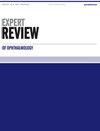Ultrasonic ocular dimensions and anthropometry in normal and myopic eyes: a case-control study
IF 0.9
Q4 OPHTHALMOLOGY
引用次数: 0
Abstract
ABSTRACT Background We compared ultrasonic ocular axial length and vitreous chamber depth, and physical anthropometry in normal and myopic African adults due to sparse related data in this setting. Research design and methods This was a hospital-based, case-control study in which 175 myopes and 175 emmetropes, recruited by convenience sampling, at General Hospital Epe, Lagos, had their anthropometry and refractive status determined; and ocular axial length and vitreous chamber depth measured with A- and B-mode ocular ultrasonography. Data was analyzed using appropriate inferential statistics and level of significance set at 0.05. Results Mean ocular axial length in normal, mild, moderate and severe myopia was 22.45mm, 23.54mm, 23.79mm, and 25.56mm while mean vitreous chamber depth in normal, mild, moderate, and severe myopia was 15.45mm, 16.63mm, 16.84mm, and 18.68mm, respectively. Males had significantly longer axial length and vitreous chamber depth than females. Correlation between weight, height and BMI and refractive status among myopes was insignificant. There was consistency between A- and B-mode ultrasonography ocular axial length and vitreous chamber measurements with a Cronbach’s Alpha of 0.888 and 0.842, respectively (p<0.001). Conclusion Ocular axial length and vitreous chamber depth increased with the severity of myopia with no correlation of anthropometry with refractive status among African myopes.正常和近视眼的超声眼尺寸和人体测量:一项病例对照研究
背景:由于相关数据较少,我们比较了正常和近视非洲成年人的超声眼轴长度和玻璃体腔深度,以及人体测量。研究设计和方法这是一项基于医院的病例对照研究,通过方便抽样从拉各斯Epe总医院招募175名近视患者和175名近视患者,确定他们的人体测量和屈光状态;A、b超测量眼轴长和玻璃体腔深度。数据分析采用适当的推断统计,显著性水平设为0.05。结果正常、轻度、中度和重度近视的平均眼轴长分别为22.45mm、23.54mm、23.79mm和25.56mm;正常、轻度、中度和重度近视的平均眼轴深分别为15.45mm、16.63mm、16.84mm和18.68mm。雄性的眼轴长度和玻璃体腔深度明显长于雌性。近视患者的体重、身高、BMI与屈光状态的相关性不显著。A、b超眼轴长与玻璃体腔测量值具有一致性,Cronbach’s Alpha值分别为0.888和0.842 (p<0.001)。结论非洲近视患者眼轴长度和玻璃体腔深度随近视严重程度的增加而增加,人体测量与屈光状态无相关性。
本文章由计算机程序翻译,如有差异,请以英文原文为准。
求助全文
约1分钟内获得全文
求助全文
来源期刊

Expert Review of Ophthalmology
Health Professions-Optometry
CiteScore
1.40
自引率
0.00%
发文量
39
期刊介绍:
The worldwide problem of visual impairment is set to increase, as we are seeing increased longevity in developed countries. This will produce a crisis in vision care unless concerted action is taken. The substantial value that ophthalmic interventions confer to patients with eye diseases has led to intense research efforts in this area in recent years, with corresponding improvements in treatment, ophthalmic instrumentation and surgical techniques. As a result, the future for ophthalmology holds great promise as further exciting and innovative developments unfold.
 求助内容:
求助内容: 应助结果提醒方式:
应助结果提醒方式:


